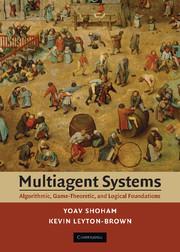Book contents
- Frontmatter
- Contents
- Credits and Acknowledgments
- Introduction
- 1 Distributed Constraint Satisfaction
- 2 Distributed Optimization
- 3 Introduction to Noncooperative Game Theory: Games in Normal Form
- 4 Computing Solution Concepts of Normal-Form Games
- 5 Games with Sequential Actions: Reasoning and Computing with the Extensive Form
- 6 Richer Representations: Beyond the Normal and Extensive Forms
- 7 Learning and Teaching
- 8 Communication
- 9 Aggregating Preferences: Social Choice
- 10 Protocols for Strategic Agents: Mechanism Design
- 11 Protocols for Multiagent Resource Allocation: Auctions
- 12 Teams of Selfish Agents: An Introduction to Coalitional Game Theory
- 13 Logics of Knowledge and Belief
- 14 Beyond Belief: Probability, Dynamics, and Intention
- Appendices: Technical Background
- Bibliography
- Index
11 - Protocols for Multiagent Resource Allocation: Auctions
Published online by Cambridge University Press: 05 June 2012
- Frontmatter
- Contents
- Credits and Acknowledgments
- Introduction
- 1 Distributed Constraint Satisfaction
- 2 Distributed Optimization
- 3 Introduction to Noncooperative Game Theory: Games in Normal Form
- 4 Computing Solution Concepts of Normal-Form Games
- 5 Games with Sequential Actions: Reasoning and Computing with the Extensive Form
- 6 Richer Representations: Beyond the Normal and Extensive Forms
- 7 Learning and Teaching
- 8 Communication
- 9 Aggregating Preferences: Social Choice
- 10 Protocols for Strategic Agents: Mechanism Design
- 11 Protocols for Multiagent Resource Allocation: Auctions
- 12 Teams of Selfish Agents: An Introduction to Coalitional Game Theory
- 13 Logics of Knowledge and Belief
- 14 Beyond Belief: Probability, Dynamics, and Intention
- Appendices: Technical Background
- Bibliography
- Index
Summary
In this chapter we consider the problem of allocating (discrete) resources among selfish agents in a multiagent system. Auctions—an interesting and important application of mechanism design—turn out to provide a general solution to this problem. We describe various different flavors of auctions, including single-good, multiunit, and combinatorial auctions. In each case, we survey some of the key theoretical, practical, and computational insights from the literature.
The auction setting is important for two reasons. First, auctions are widely used in real life, in consumer, corporate, as well as government settings. Millions of people use auctions daily on Internet consumer Web sites to trade goods. More complex types of auctions have been used by governments around the world to sell important public resources such as access to electromagnetic spectrum. Indeed, all financial markets constitute a type of auction (one of the family of so-called double auctions). Auctions are also often used in computational settings, to efficiently allocate bandwidth and processing power to applications and users.
The second—and more fundamental—reason to care about auctions is that they provide a general theoretical framework for understanding resource allocation problems among self-interested agents. Formally speaking, an auction is any protocol that allows agents to indicate their interest in one or more resources and that uses these indications of interest to determine both an allocation of resources and a set of payments by the agents.
- Type
- Chapter
- Information
- Multiagent SystemsAlgorithmic, Game-Theoretic, and Logical Foundations, pp. 315 - 366Publisher: Cambridge University PressPrint publication year: 2008



